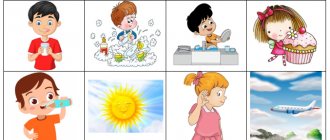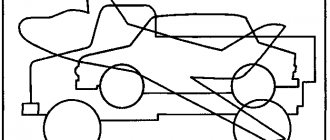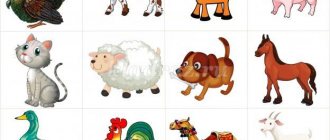Summary of OOD on familiarization with the outside world on the topic: “Utensils”
Summary of OOD on familiarization with the outside world
on the topic: "Dishes"
Author:
teacher
Mikolyan Ksenia Andreevna
Target:
to form children’s understanding of the types of dishes; teach how to use utensils in accordance with their intended purpose.
Tasks:
Social and communicative development:
cultivate a friendly attitude towards peers, the ability to listen to each other; teach children to be attentive to loved ones and take care of them.
Cognitive development:
to develop in children the ability to distinguish and name utensils; learn to group and combine utensils according to similar characteristics (according to their purpose).
Speech development:
develop children’s ability to answer questions clearly and completely; develop speaking skills; enrich children's vocabulary.
Physical development:
to form basic healthy lifestyle skills in preschoolers.
Artistic and aesthetic development:
strengthen children’s ability to decorate dishes using lines, strokes, dots, circles and other familiar elements; develop aesthetic perception, independence, initiative.
Preliminary work with children:
monitoring the serving of food and washing dishes; conversation about the use of dishes, what they are made of; reading the work of K. Chukovsky “Fedorino’s grief”.
Progress of the lesson:
Educator: Guys, do you like to solve riddles?
Children: children's answers.
Educator: Then listen to the riddles and tell the answers.
Who doesn’t have the answer - What should I cook my lunch in? There is a clean thing on the stove. To cook the soup, you need... (saucepan)
Made of iron, cast iron - With a long handle and round, You can fry on it without difficulty! What's this? (Pan)
If you want tea, choose any one! Here they are - fatties. Who are they? (Mugs)
In order for everyone to have dinner together, what should be put on the table? Deep or shallow For food... (Plate)
He puffs like a steam locomotive, holding his nose up. Make some noise, calm down - Invite the seagull to drink. (Kettle)
A boat is floating on my plate. I put the boat of food into my mouth. (Spoon)
If sharpened well, it cuts everything very easily - Bread, potatoes, beets, meat, Fish, apples and butter. (Knife)
Educator: Well done guys, you guessed all the riddles.
-Tell me guys, what were the riddles about?
Children: children's answers.
Educator: What can you call it, in one word?
- What other dishes do you know? -What are the dishes for? — Is it possible to live without dishes?
Children: children's answers.
Educator: Let's listen to a poem about what we would do if there were no dishes: If there were no dishes, We would have had a very bad time. We would immediately turn from people into savages: We would take the meat with our hands, we would tear it with our teeth, we would drink water in the river, or in a dirty stream. Fortunately, various utensils help us everywhere: They put food on it, they eat and drink from it. They store food in it: Cheese and butter, bread and fruit... Hundreds of dishes are prepared in it - Boiled, fried and baked! Educator: That's how much we need dishes.



